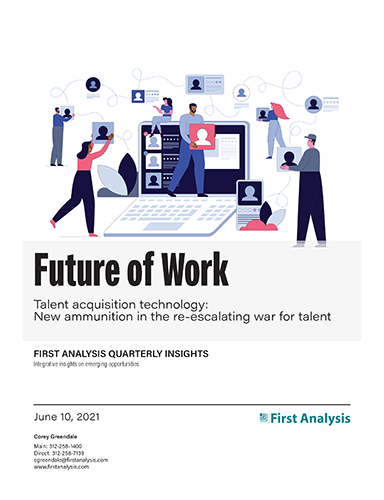Quarterly insights: Future of Work
Talent acquisition technology: New ammunition in the re-escalating war for talent

After COVID-19 initially created a surge in unemployment last year, the supply of qualified workers relative to demand, which had already been tightening for years prior, resumed its tightening trend. One indicator of the imbalance hit its highest level in the past 15 years in April 2021. In some ways, COVID-19 exacerbated the tightening trend despite the economic dislocations it caused.
As power in the skilled labor market shifts further to the supply side and employers increasingly compete for the best talent, technologies that help employers effectively find and attract the talent they need are more critical than ever.
We discuss two companies that provide such technology: newly publicly traded ZipRecruiter (ZIP) and privately held Visage, a new First Analysis portfolio company. ZipRecruiter’s jobs-talent matching platform increases labor market efficiency by marrying a large pool of job openings with a large pool of job seekers and providing numerous tools that optimize matches across the pools.
Visage likewise increases labor market efficiency, but while ZipRecruiter focuses on connecting active job seekers with opportunities, Visage focuses on connecting employers with passive candidates: those who may not be actively looking to change jobs, but are willing to consider alternatives when presented with strong-fit opportunities.
With no sign of a cease-fire in the war for talent anytime soon, we anticipate robust demand for such technologies.
TABLE OF CONTENTS
Includes discussion of ZipRecruiter (ZIP) and Visage
- The war for talent is as hot as ever
- Enter ZipRecruiter for active candidate sourcing…
- … and Visage for passive candidate sourcing
- Expect continued robust demand for talent acquisition technology
- Future of work index falls behind both S&P 500 and Nasdaq
- M&A pace slows a bit but remains strong in Q2
- Private placement activity remains strong in Q2
The war for talent is as hot as ever
In 2014, we published a white paper on talent acquisition technology entitled “The War for Talent Will Be Won in the Cloud,” discussing the reasons power in the skilled labor market would increasingly shift to the supply side and exploring technologies that could help employers efficiently find and attract the talent they need. Fast-forward to 2021: workers in some industries face a challenging pandemic-impacted environment, but COVID-19 has proven to be the opposite of a cease-fire in the war for skilled talent. Quarantines have enabled many employers to experience the feasibility of fully remote work and the consequent potential for hiring workers residing in regions distant from corporate headquarters. While we believe many companies will want to have some physical presence for workers to collaborate and build culture, over time we expect the increased flexibility from more remote work will make the labor market more fluid and benefit both workers and employers. Initially, however, we believe many employers are struggling to keep up as their current employees become more subject to poaching by competitors from different regions, and they haven’t yet become proficient at expanding their recruiting funnels. Furthering the challenge for employers, COVID-19 has constrained labor supply, as some workers still fear for their health if they return to a traditional work environment, and others have had to become full-time caregivers because of a shift to virtual schooling or COVID-19-related health issues.

Request full report
To access the full report, please provide your contact information in the form below. Thank you for your interest in First Analysis research.
